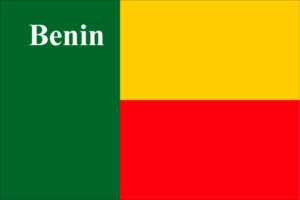 Benin is a former French colony that gained its independence in 1960 and therefore French is the official language and formal language of instruction. According to the Constitution of 1990, Benin guarantees access to free education for children to ensure that all Beninese people are healthy, balanced, educated, and technologically competent. Furthermore, due to the 50 national languages in Benin other than French, the Constitution of 1990 declares that all the communities of Benin have the right to use their native languages and to develop their own culture.
Benin is a former French colony that gained its independence in 1960 and therefore French is the official language and formal language of instruction. According to the Constitution of 1990, Benin guarantees access to free education for children to ensure that all Beninese people are healthy, balanced, educated, and technologically competent. Furthermore, due to the 50 national languages in Benin other than French, the Constitution of 1990 declares that all the communities of Benin have the right to use their native languages and to develop their own culture.
Primary education is obligatory in Benin and lasts for six years usually from the ages of 6-11. There are also preschool programs lasting two years for children between the ages of 3-5. Secondary education is broken up into separate programs: general secondary education and technical secondary education.
Under the general secondary education program the first cycle lasts four years and culminates with the award of the Brevet d’Etudes du Premier Cycle (BEPC) or Certificate of First Cycle Studies. The second cycle lasts three years and culminates with the baccalaureate examination which is separated into four options: languages and social studies, economics, mathematics, and biology.
The technical secondary education program is also broken up into two cycles. The first cycle lasts 3-4 years and culminates with the award of the Certificat d’Aptitude Professionnelle (CAP) or Certificate of Professional studies. The second cycle lasts 3-4 years and awards either the Technical Education Baccalaureate or a technical diploma (i.e. Nursing diploma).
Grading in Benin is based on the French system as follows:
| Grade | Description | Translation | U.S. Grade Equivalence |
|---|---|---|---|
| 16-20 | Très Bien | Very Good | A+ |
| 14-15 | Bien | Good | A |
| 12-13 | Assez Bien | Good Enough | B |
| 10-11 | Passable | Passing | C |
| 0-9* | Ajourné | Fail | F |
| *Grades of 8 and 9 may be considered passing for students with an overall average of 10 or higher. | |||
The education system and curriculum in Benin focus on the development of skills, capacities, strategies, and knowledge. In keeping with these goals the government has established a national curriculum whereby primary school students study French, mathematics, scientific and technological studies, social studies, art (including singing, drawing, etc.), and physical education. In secondary school, students continue these subjects while adding classes in English, history and geography, biology, physics, family economics, civil education, philosophy, and a second foreign language of the student’s choice.
Higher education is split between universities, the Grandes Ecoles, and university institutes of technology. The main institution of higher education in Benin is the National University of Benin which has 10 branches. University accreditation is goes through the Ministry of Education and there are currently 94 accredited public and private universities in the countries. Admissions for higher education are based upon results for the Technical Education Baccalaureate and the General Baccalaureate.
© 2025 Gaetranslations | Terms & Conditions
Website by: Timefortheweb